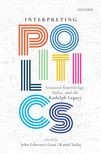 Interpreting Politics: Situated Knowledge, India, and the Rudolph Legacy
Interpreting Politics: Situated Knowledge, India, and the Rudolph Legacy
Contents
-
-
-
-
-
-
-
-
-
The Intellectual Depth and Breadth of the Rudolphs’ Work The Intellectual Depth and Breadth of the Rudolphs’ Work
-
Political Psychology Political Psychology
-
Political Leadership Political Leadership
-
Expectations, Political Development, and Political Violence Expectations, Political Development, and Political Violence
-
Moral Imagination Moral Imagination
-
-
Impact of the Rudolphs: A Scholar’s Experience Impact of the Rudolphs: A Scholar’s Experience
-
Research on Self-Interest, Altruism, and Moral Choice Research on Self-Interest, Altruism, and Moral Choice
-
The Ethical Perspective The Ethical Perspective
-
Political Psychology and Ethics: Surviving Political Trauma with One’s Humanity Intact Political Psychology and Ethics: Surviving Political Trauma with One’s Humanity Intact
-
Narrative Narrative
-
-
Endnotes Endnotes
-
References References
-
-
-
-
-
-
-
-
4 A Different Way of Seeing Things: The Intellectual Legacy of Lloyd and Susanne Rudolph
Get access-
Published:September 2020
Cite
Abstract
Kristen Monroe analyses the Rudolphs’ innovative use of political psychology in their study of identity, political leadership, and the consequences of perception for political action. She draws inspiration from the Rudolphs’ work on Gandhi to develop the concept of ‘moral imagination’, or the capacity to empathize with other people’s lives in ways that recast moral issues in a light that leads to innovative solutions to moral problems. Moral imagination plays a crucial role in explaining altruism and heroism. Conversely, people’s capacity to dehumanize others is an important cause of terrorism and genocide. Monroe’s analysis underscores the importance of emotions in shaping: peoples’ perceptions, moral choices, and political action. She advocates moving beyond mechanical models of ‘scientific’ explanation and developing a humanistic social science that leaves us open to surprises resulting from the innovatively creative behaviour of our fellow human beings.
Sign in
Personal account
- Sign in with email/username & password
- Get email alerts
- Save searches
- Purchase content
- Activate your purchase/trial code
- Add your ORCID iD
Purchase
Our books are available by subscription or purchase to libraries and institutions.
Purchasing information| Month: | Total Views: |
|---|---|
| November 2022 | 1 |
| May 2023 | 2 |
| June 2024 | 1 |
| July 2024 | 2 |

Get help with access
Institutional access
Access to content on Oxford Academic is often provided through institutional subscriptions and purchases. If you are a member of an institution with an active account, you may be able to access content in one of the following ways:
IP based access
Typically, access is provided across an institutional network to a range of IP addresses. This authentication occurs automatically, and it is not possible to sign out of an IP authenticated account.
Sign in through your institution
Choose this option to get remote access when outside your institution. Shibboleth/Open Athens technology is used to provide single sign-on between your institution’s website and Oxford Academic.
If your institution is not listed or you cannot sign in to your institution’s website, please contact your librarian or administrator.
Sign in with a library card
Enter your library card number to sign in. If you cannot sign in, please contact your librarian.
Society Members
Society member access to a journal is achieved in one of the following ways:
Sign in through society site
Many societies offer single sign-on between the society website and Oxford Academic. If you see ‘Sign in through society site’ in the sign in pane within a journal:
If you do not have a society account or have forgotten your username or password, please contact your society.
Sign in using a personal account
Some societies use Oxford Academic personal accounts to provide access to their members. See below.
Personal account
A personal account can be used to get email alerts, save searches, purchase content, and activate subscriptions.
Some societies use Oxford Academic personal accounts to provide access to their members.
Viewing your signed in accounts
Click the account icon in the top right to:
Signed in but can't access content
Oxford Academic is home to a wide variety of products. The institutional subscription may not cover the content that you are trying to access. If you believe you should have access to that content, please contact your librarian.
Institutional account management
For librarians and administrators, your personal account also provides access to institutional account management. Here you will find options to view and activate subscriptions, manage institutional settings and access options, access usage statistics, and more.